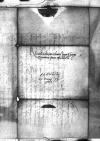Quae pericula et discrimina impendeant universae reipublicae Christianae propter eas clades, quas serenissimi et excellentissimi fratres, ⌊imperatoria et regia Romanorum maiestates⌋, proximis superioribus mensibus ingentes acceperunt, non ignorat procul dubio Paternitas Tua. Ne nos quidem vacuo esse animo possumus ab omni periculi metu, etiamsi a nemine paper damaged⌈[ne]ne paper damaged⌉ indictum ac denuntiatum bellum habemus, quare paper damaged⌈[uare]uare paper damaged⌉ pro officio nostro regio, quo summo possumus, studio providere conamur, ut ratio propulsandi periculi iniri possit, ut si quis de improviso in regnum ditionesque nostras impetum hostis fecerit, ne nos prorsus imparatos offendat. Quare cum de hac causa, tum aliis nonnullis de rebus legatum nostrum ad ⌊comitia terrarum nostrarum Prussiae⌋ ⌊Mariemburgi⌋ proximo mense Maio celebranda designavimus. Paternitatem Tuam hortamur, ut ipsa quoque ad ea se ⌊comitia⌋, quae pro 1542-05-08⌊festo divi Stanislai1542-05-08⌋ ⌊Mariemburgi⌋ habebuntur, conferat et ubi mandata nostra exposita per legatum nostrum fuerint, una cum aliis pro officio suo diligenter consultet ac prospicere omni ratione conetur, ut ne quid ⌊terrae nostrae Prussiae⌋ detrimenti accipiant, cum ⌊regno⌋ nostro separatim ab illis nihil accidere possit. Factura pro officio suo et gratia nostra.


 BNW, BOZ, 953, f. 206v
BNW, BOZ, 953, f. 206v